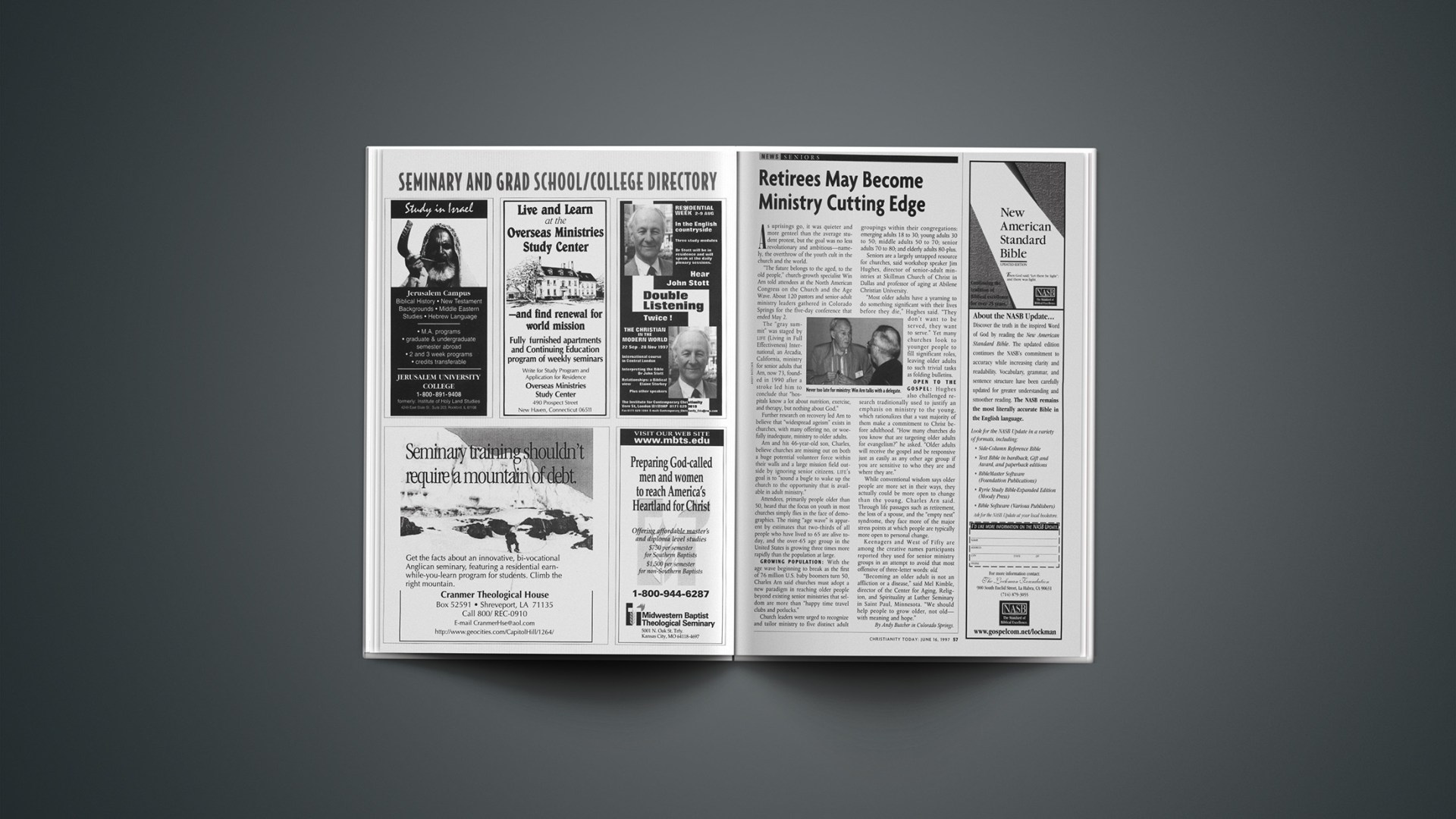As uprisings go, it was quieter and more genteel than the average student protest, but the goal was no less revolutionary and ambitious—namely, the overthrow of the youth cult in the church and the world.
“The future belongs to the aged, to the old people,” church-growth specialist Win Arn told attendees at the North American Congress on the Church and the Age Wave. About 120 pastors and senior-adult ministry leaders gathered in Colorado Springs for the five-day conference that ended May 2.
The “gray summit” was staged by LIFE (Living in Full Effectiveness) International, an Arcadia, California, ministry for senior adults that Arn, now 73, founded in 1990 after a stroke led him to conclude that “hospitals know a lot about nutrition, exercise, and therapy, but nothing about God.”
Further research on recovery led Arn to believe that “widespread ageism” exists in churches, with many offering no, or woefully inadequate, ministry to older adults.
Arn and his 46-year-old son, Charles, believe churches are missing out on both a huge potential volunteer force within their walls and a large mission field outside by ignoring senior citizens. LIFE’s goal is to “sound a bugle to wake up the church to the opportunity that is available in adult ministry.”
Attendees, primarily people older than 50, heard that the focus on youth in most churches simply flies in the face of demographics. The rising “age wave” is apparent by estimates that two-thirds of all people who have lived to 65 are alive today, and the over-65 age group in the United States is growing three times more rapidly than the population at large.
GROWING POPULATION: With the age wave beginning to break as the first of 76 million U.S. baby boomers turn 50, Charles Arn said churches must adopt a new paradigm in reaching older people beyond existing senior ministries that seldom are more than “happy time travel clubs and potlucks.”
Church leaders were urged to recognize and tailor ministry to five distinct adult groupings within their congregations: emerging adults 18 to 30; young adults 30 to 50; middle adults 50 to 70; senior adults 70 to 80; and elderly adults 80-plus.
Seniors are a largely untapped resource for churches, said workshop speaker Jim Hughes, director of senior-adult ministries at Skillman Church of Christ in Dallas and professor of aging at Abilene Christian University.
“Most older adults have a yearning to do something significant with their lives before they die,” Hughes said. “They don’t want to be served, they want to serve.” Yet many churches look to younger people to fill significant roles, leaving older adults to such trivial tasks as folding bulletins.
OPEN TO THE GOSPEL: Hughes also challenged research traditionally used to justify an emphasis on ministry to the young, which rationalizes that a vast majority of them make a commitment to Christ before adulthood. “How many churches do you know that are targeting older adults for evangelism?” he asked. “Older adults will receive the gospel and be responsive just as easily as any other age group if you are sensitive to who they are and where they are.”
While conventional wisdom says older people are more set in their ways, they actually could be more open to change than the young, Charles Arn said. Through life passages such as retirement, the loss of a spouse, and the “empty nest” syndrome, they face more of the major stress points at which people are typically more open to personal change.
Keenagers and West of Fifty are among the creative names participants reported they used for senior ministry groups in an attempt to avoid that most offensive of three-letter words: old.
“Becoming an older adult is not an affliction or a disease,” said Mel Kimble, director of the Center for Aging, Religion, and Spirituality at Luther Seminary in Saint Paul, Minnesota. “We should help people to grow older, not old—with meaning and hope.”
Copyright © 1997 Christianity Today. Click for reprint information.










